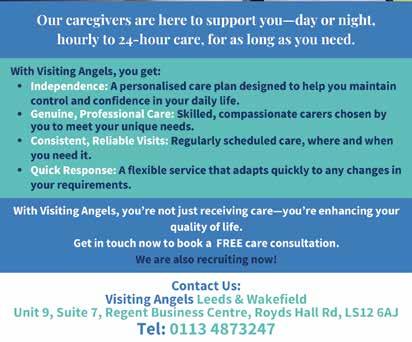






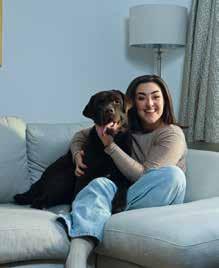























The new £12m Elective Care Unit at Wharfedale Hospital – which reduces the time patients wait for surgery and provides protected space for planned operations to take place – was officially opened by Katie White, MP for North West Leeds, in January.
Ms White joined Trust Chair Dame Linda, Director of Estates and Facilities Craige Richardson, and other colleagues to officially open the facility.
The Elective Care Hub at the hospital in Otley creates additional operating theatre capacity away from the Trust’s main acute hospital sites, increasing the number of patients that can be treated each week. Having a dedicated Elective Care Hub away means there is capacity which can confidently be used all-year-round.
It includes two new theatres (taking the total number at the hospital to four), a recovery area, an admissions and discharge area alongside making an existing ward operational overnight.
Katie White MP said: “It was a privilege to open the new Elective Care Hub, meeting the dedicated staff and seeing their commitment to delivering the best care for patients was truly inspiring.
“The new facilities will make a real difference to services and improve support for patients in Leeds North West. And the inclusion of renewable energy sources in the Hub, such as the solar panel canopy in the car park, will help lower emissions for a healthier planet.
“Improving and reforming our NHS won’t be quick or easy. But the government has the plan, the investment, and the determination to get it done. I’m proud to stand alongside the NHS staff I met at Wharfedale, and I will keep standing up for a better health service for everyone in our community.”
It is estimated that an additional 3,500 people per year will be seen, and patients will benefit from the quieter, relaxed environment and faster treatment times.
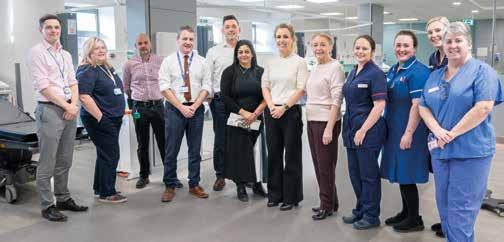
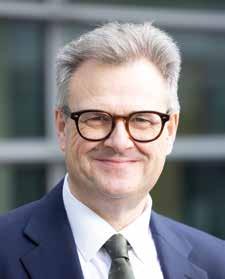
I want to start this issue of Bulletin by mentioning the unannounced CQC inspections of our maternity and neonatal services that we welcomed to LTHT in December and January. We are committed to providing the best possible care for the women and families who use these services, and I am pleased that there were no significant patient safety concerns raised at the time by the inspection team. I’m extremely grateful to our maternity and neonatal colleagues –not only for their help in ensuring the inspections went so smoothly – but also for all the hard work that goes into caring for the women, babies and families in our hospitals, all the year round. Turn to p. 10 to hear about some of the recent successes of our maternity and Women’s Services teams. There is plenty to look forward to in 2025, a year in which I’m excited to see some long-term projects come to fruition, not least of which is The Rob Burrow Centre for MND Care – thanks to the many efforts and donations to the Leeds Hospitals Charity campaign. After all this time, the new centre is due to complete and open this summer – something we can all be proud of. Read about the latest developments on p. 8.
Elsewhere in this issue you can read all about two eye-opening UK-firsts happening right here in Leeds. It’s an exciting time to be part of LTHT. Read on to find out more.
Kind regards
Prof. Phil Wood Chief Executive
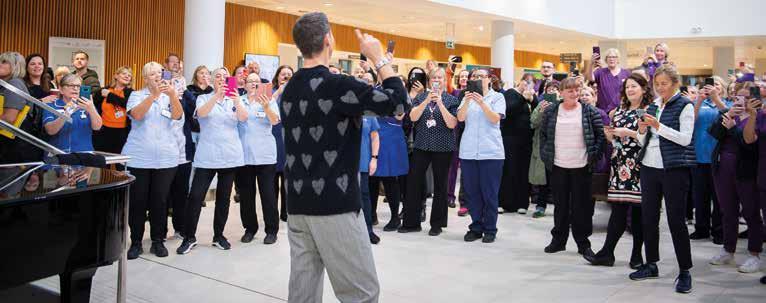
In October, patients and staff at Leeds Cancer Centre were treated to a surprise celebrity visit from Wet Wet Wet frontman Marti Pellow.
The Scottish singer visited the Trust as part of ITV’s Lorraine Kelly’s Change+Check campaign, raising awareness of breast cancer and encouraging early detection. The sixth year of the campaign coincided with the 30th anniversary of the iconic Wet Wet Wet song ‘Love is All Around’, with the song fronting the campaign.
Pellow visited the radiotherapy and chemotherapy day units speaking to staff and patients about cancer awareness and bringing lots of enjoyment. Visitors to the Bexley wing’s atrium were then treated to a rousing singalong to the band’s smash hit, ‘Love is All Around’, with accompaniment from the atrium piano.
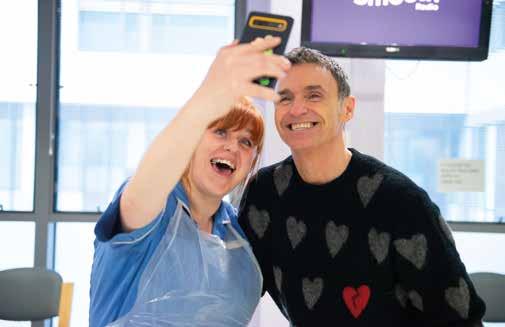
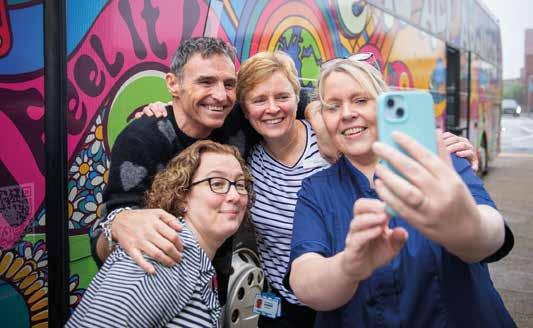
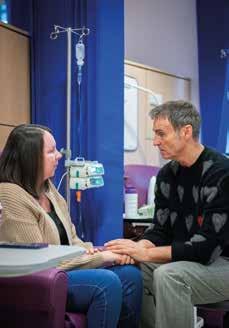
A state-of-the-art cardiac catheter lab was officially opened at Leeds General Infirmary this winter, completing a major programme of works.
This was the sixth new cardiac catheter lab to be completed at the Trust, the culmination of a project to improve facilities in the department, which is based in Jubilee Wing. Alongside this programme, a new managed equipment service provided by Philips Healthcare has also been implemented.
Jenny Lewis, the Trust’s Director of Human Resources and Organisational
Development, attended the opening, and said: “I was thrilled to welcome representatives from Philips and members of our Non-Executive team to celebrate the opening of our sixth and final state-of-the-art Cardiac Catheter Lab (Cath Lab) at Leeds General Infirmary.
“These cutting-edge Cardiac Cath Labs support a wide range of cardiac procedures. Equipped with advanced imaging capabilities such as realtime coronary artery visualisation and HeartNavigator for planning and guiding structural heart disease
interventions, the labs exemplify innovation in healthcare technology.”
Over the past four years, all six labs have been remodelled and refurbished with brand new state-of-the-art imaging systems installed. Buildings and infrastructure have also been upgraded to the latest healthcare standards.
Alongside this work the patient recovery area has also been expanded, increasing the number of bed bays from four to eight, to meet the needs of the increased activity through the labs and improve the overall patient experience.
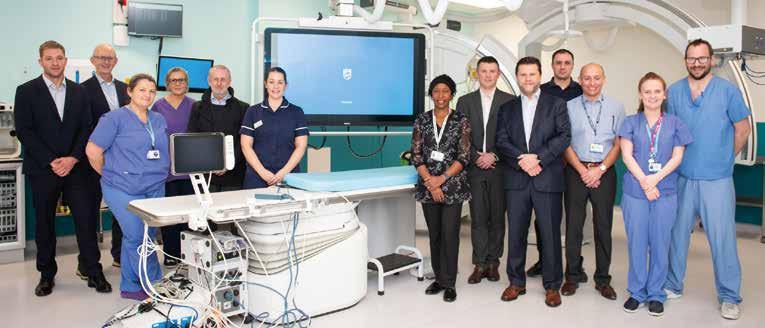
One of the Trust’s leading clinical scientists, Dr Kerrie Davies, has been recognised in this year’s Kings New Year Honours List in recognition of her outstanding contributions to healthcare science.
Kerrie was awarded with a Member of the Most Excellent Order of the British Empire (MBE), the third highest ranking award in the Order of the British Empire and is awarded to people who have made a significant and long-term impact on their community.
Throughout her distinguished career, Kerrie has been instrumental in advancing diagnostic science. During the COVID-19 pandemic, she was seconded to the Technologies Validation
Group, where she led the validation of COVID-19 tests, ensuring their reliability and advising on new regulations to safeguard test quality in the UK.
Kerrie’s MBE is a well-deserved recognition of her dedication and expertise in healthcare science. Her work has strengthened the UK’s COVID-19 response and continues to shape the future of healthcare diagnostics. At the Trust, Kerrie has continued to make significant contributions in her many and varied roles in research.
Kerrie said: “I am very grateful to have been recognised, especially for my role in healthcare science. Although an often unrecognised and undervalued
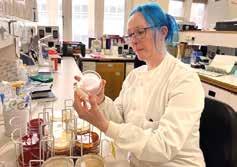
part of the NHS, healthcare scientists are experts in their field, bringing cutting edge science into the NHS, for the benefit of patients and their care. I hope this honour goes some way to raising the profile of healthcare science and scientists everywhere.”
Our 7 Commitments are about focusing our collective efforts across the Trust to make progress in what matters most – by delivering these we will be able to realise our strategic priorities and ultimately our vision to provide the highest quality specialist and integrated care.
During 2024-25, we’ve been dedicating each month since June to one of our commitments. In December we heard how teams are helping make greater use of our existing digital resources, and January saw a focus on improving staff retention. Here are a few of the stories in the spotlight. Search: 7 Commitments on the Intranet for more.

We have lots of fantastic digital facilities and systems which already exist across the Trust, and we’ve invested a lot in developing them, so it’s important to make sure we’re getting the most out of them.
To support this, we’ve been sharing knowledge, best practice examples and training opportunities, helping people understand more about our digital systems and how they can be used to support patient care.
Our Children’s Safeguarding Team and Emergency Department have successfully transformed the management process of social care referrals using Custom Lists. The teams collaborated to create
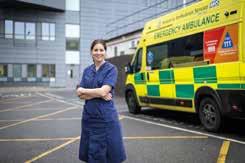
a robust, streamlined workflow that eliminates manual printing, scanning, and re-uploading. This has achieved a significant reduction in administrative burden, allowing colleagues to dedicate more time to patient care.
Gemma Gregory, Deputy Head of Nursing – Urgent Care, said: “Custom Lists in PPM+ helps us manage referrals quickly and effectively, meaning more hands-on time with patients.”
The new Recovery Care Plan in PPM+ is designed to help get our patients home sooner. This acts as a shared, live document, allowing information to be captured in a single place. It plays an important role in HomeFirst, Leeds’ intermediate care transformation programme, which is designed to help patients to stay at home and receive care, or return home sooner, rather than staying in hospital. The Recovery Care Plan is helping organisations across the city understand our patient’s discharge plans so they can get home sooner. The J16 team was one of the first to implement the new function in PPM.
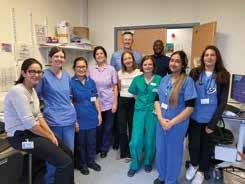
‘Home Tomorrow, Medicines Today’ promotes effective use of our electronic discharge advice note (eDAN) in PPM+. As well as using our digital systems to their full potential, we’re also focusing on reducing waits for our patients. An important part of this is getting patients home as soon as they’re ready for discharge, and eDAN plays an important role.
The J12 and J45 teams are doing some fantastic work to make sure eDANs
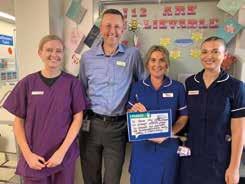
are completed in good time – thinking ahead, working together to update information at regular intervals and creating protected time to complete.
The teams said: “Thinking ahead and working together to complete our eDANs in advance helps us get our patients home on time.”
To find out more about any of these stories, access the Resource commitment page on the Intranet. If you have a story about getting the most from our digital systems, please get in touch: leedsth-tr. ditcomms@nhs.net
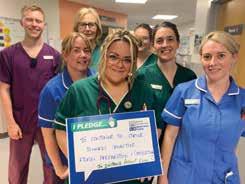
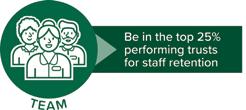
Over the last two years of our Team commitment we have decreased voluntary turnover and improved staff engagement – and this is all better than the national average for similar-sized trusts, but we know there is more we can do to support our staff to stay and thrive.
CSUs have been sharing some of the ways they’ve been acting on feedback from colleagues to ensure they can be at their best at LTHT.
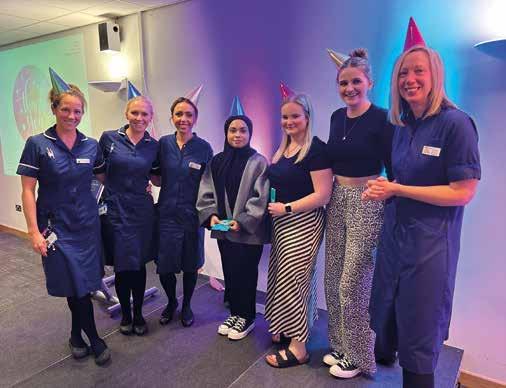
Nursing staff at Leeds Children’s Hospital have been listening and responding to feedback from new nurses in order to improve staff retention. Ward managers recognised how challenging the first year as a qualified children’s nurse can be and how it can feel like a big leap from being a student nurse.
The ‘Nurse-versary’ event was created to help celebrate nurses completing their first year in practice, whilst recognising their achievement at a pivotal point in their career and giving them time to reflect with the support of their peers.
The first party-themed Nurse-versary event was held in September. Nurses from across the children’s hospital were invited to attend and enjoyed some well-earned time away from clinical duties, heard messages of thanks from their ward managers, and were presented with a commemorative pin-badge by their Head of Nursing.
During the event new nurses took part in group discussions where they were encouraged to reflect on their
personal challenges and successes as well as suggest improvements to help the next cohort of new nurses to make the most of their first year.
Leeds Hospitals Charity funding has since been secured to hold a second event in 2025 and Nurse-versary is hoped to become an annual event. It’s a long-term strategy but data indicates a steady improvement in rates of voluntary turnover for nurses at Leeds Children’s Hospital, from 7.3% in April 2023 to 4.9% in January 2025. Feedback from new nurses who attended the event was extremely positive.
Bridget Sutton, Deputy Head of Nursing, said: “I’m extremely proud of the matrons and ward leaders who have planned and delivered the first Nurse-versary event and it’s testament to their hard work to see indications that more nurses are opting to stay at Leeds Children’s Hospital after their first year. Through this and other initiatives we aim to ensure that all our nurses feel empowered and supported as part of Leeds Children’s Hospital as well as LTHT as a whole.”
Speciality and Integrated Medicine (SIM) has been exploring alternative methods of communication with staff in the CSU.
Working on annual Staff Survey feedback, colleagues in SIM launched their own #SIMplyAudible – audio soundbites to communicate key updates and share good practice with colleagues in a more accessible way that respects the amount of time colleagues have in their busy workdays.
Zoe Brown, Staff Engagement Advisor in SIM, said: “The retention of experienced, committed staff is key to the success of LTHT. In SIM we have piloted many ideas of how we can ensure that the staff feel valued and have a voice that is not only heard but acted on.
“Staff have expressed concerns on how many emails are received and that they simply don’t have time to read them all. This got me thinking about how we can spread news, messages, initiatives and important information using different technologies and platforms.
“We have created a series of audio bites, named #SIMplyAudible, by the staff in SIM. These are produced as short videos with audio and subtitles, ensuring it is inclusive for everyone. This gives staff of all grades, a podium to share key messages and have their voice heard, but also to be recognised for the amazing work they do. This enables good practice to cascade through the CSU and it means more to people because this comes from the team and not a top-down approach.”
To find out more about any of these stories, access the Team commitment page on the Intranet.

The Motor Neurone Disease (MND) community gathered at Seacroft Hospital in December to commemorate a significant milestone in the construction of the Rob Burrow Centre for Motor Neurone Disease.
This remarkable event saw patients, families, healthcare professionals, and 77 dedicated fundraisers from Leeds Hospitals Charity unite in a moment of solidarity and celebration. Among those present were Geoff and Irene Burrow, the parents of rugby legend Rob Burrow, who have been steadfast supporters of the initiative. Together, they signed the frame of the building, symbolising their shared commitment to advancing care for those affected by this debilitating disease.
This special occasion coincided with the announcement that the ambitious £6.8m fundraising target for the centre’s construction had been successfully met. The achievement was made possible by the generosity of over 17,000 donors from across the country, whose collective efforts have turned a vision into reality.
Paul Watkins, Director of Fundraising at Leeds Hospitals Charity, reflected on the impact of this generosity: “The Burrow family has inspired people across the country and created an incredible community who have supported this appeal. To have some of those supporters here with us today, leaving their own mark on the frame, is just wonderful.”
The Rob Burrow Centre represents a ground-breaking step forward in the provision of care for MND patients. Designed to accommodate their evolving
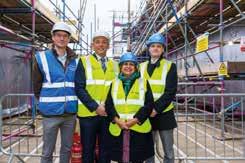
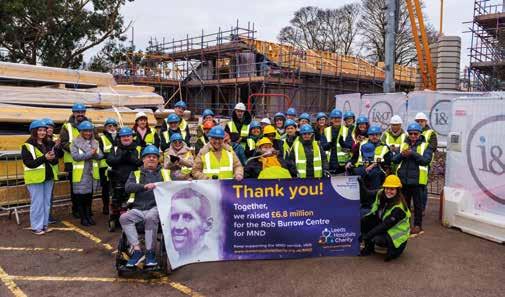
and complex needs, the state-of-the-art facility will include a light-filled atrium to create a welcoming atmosphere, accessible parking to cater for mobility challenges, and beautifully landscaped gardens to provide a tranquil space for patients and their families. Plans are also in place to integrate cutting-edge research programmes, ensuring that Leeds remains at the forefront of efforts to combat MND.
Construction has progressed rapidly, thanks to innovative offsite building techniques. Craige Richardson, Director for Estates & Facilities at Leeds Teaching Hospitals NHS Trust, highlighted the significance of this milestone: “The building is quickly taking shape, and progress is going well. The site team will soon be focusing on the interior clinical spaces, and it won’t be long until the opening.”
Although the primary funding goal for construction has been reached, fundraising efforts will continue to ensure that the centre is equipped with the latest medical technology, therapeutic gardens, family support services, and holistic therapies to enhance patient well-being.
Paul Watkins expressed his appreciation for the ongoing generosity of the
public: “We’d like to say thank you to every person, every company, every school group, and sports team who have helped to make the building of this centre a reality.”
For many within the MND community, the centre is far more than just a medical facility—it is a symbol of resilience, hope, and collective strength. It is a testament to what can be achieved when people unite behind a common cause, determined to improve the lives of those facing one of the most challenging neurological diseases.
As the final stages of construction approach, anticipation continues to build for the official opening later this year. The Rob Burrow Centre for Motor Neurone Disease will stand as a flagship facility in the North of England, offering life-changing care and support to patients and families.
With the signatures of supporters now etched onto its frame, the centre embodies a shared vision of a brighter future for those living with MND. It is a place of compassion, innovation, and, above all, hope—ensuring that Rob Burrow’s legacy and the dedication of countless others will continue to inspire for years to come.
Ultrarunner Mel Sykes wasn’t sure she would be able to run again – but less than 18 months after undergoing brain surgery at Leeds General Infirmary, she completed the infamous Spine Race. Mel, from Holmfirth, finished the race –running 268 miles along the whole of the Pennine Way – in January, in just over 132 hours.
Getting to the start line was a major achievement, after she developed a Chiari malformation in 2023. The condition pushes part of the brain out through the bottom of the skull, pressing on the spinal cord and brain stem, causing double vision and balance problems. Mel was treated in October 2023 by the specialist neurosurgery team at Leeds Teaching Hospitals, under the care of Mr Ian Anderson.
“Getting to the start was a win – and then to finish, I’m absolutely over the moon,” said Mel.
The race started in thick snow in Edale in Derbyshire, the runners facing drifts and ice. “I enjoyed it. I was tough but I knew it was going to be hard work,” said Mel. “The first two days from Edale to Hawes it was going through deep snow drifts, ploughing through snow halfway up your thighs, it was really tough going. The north section then ended up not being too bad. The bit when I was at Hadrian’s Wall, the sun was out all day, it was lovely.”
There were some tricky times along the way – Mel started to get hypothermic
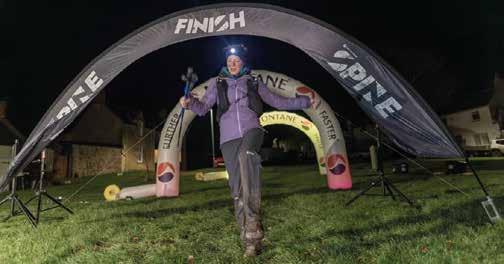
during a storm in the Yorkshire Dales.
“This storm started, all the mist came down. I was trying to follow the path but I got completely lost. It was just horrendous,” she said.
Mel managed to find shelter and warmed up with the support of a safety team, determined not to drop out of the race. She said: “I just wanted to get in the car and get warm but you’re not allowed, I would have been disqualified. One of the safety team members called Ian helped me get into my bivvy bag. I stayed in the toilets for two hours wrapped in my sleeping bag until I’d got warm again. I kept saying ‘Ian, I’m not dropping out!’”
Mel also lost her voice halfway through the race, and then cracked her ribs just a

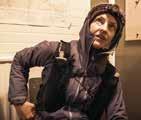
mile and a half before the finish.
“I’d done the whole race and fell a few times on the ice but not done much damage,” she said. “I just got giddy about a mile and a half from the end, I was running down the hill and my foot hit a stone and I fell forwards and cracked my ribs.
“It was just amazing to reach the finish. There were so many people there as well. It was weird because I thought I’d cry but I was so relieved to finish. I was just chuffed to bits really.”
Since completing the event, Mel has been recovering. “I would imagine I had less than five hours’ sleep altogether. My ankles are bigger than my waist. I didn’t get one blister but my ankles are really swollen. I’ve just been falling asleep all the time. All I’ve done is just sleep and eat.”
After a well-earned rest, she’ll be preparing for the Lakeland 100 in July. But will she run the Spine again? “I think it was just the perfect race. I think if you go and do it again it might ruin the memory of it. But most people say never again and then go back,” she said.
Mr Anderson, Consultant Neurosurgeon at Leeds Teaching Hospitals, said: “Mel is a really inspirational patient and has shown huge determination to recover and return to ultrarunning. She had severe symptoms when she came to us and needed surgery urgently. It’s fantastic to see how well she recovered – completing this race is a truly remarkable achievement.”
A new photography exhibition celebrating diversity and individuality in maternity has opened at Thackray Museum of Medicine. The exhibition, created in collaboration with the maternity health equity team and Lens Lab Project, features photos taken at Maternal Journal art classes last summer.
The classes provided a space for pregnant women to share experiences and express themselves through creative activities including bump casting, painting, and collage making. Held in Chapeltown, they fostered an inclusive environment close to home - with many participants sharing the sense of safety and trust they felt at the free classes funded by Leeds Hospitals Charity.
Natalya, who is featured in the exhibition with her daughter Zoya, commented: “As a mother, I’m grateful that I was able to attend these sessions and experience first-hand how beneficial creative journaling can be for mental health and wellbeing. As a midwife, I’m really proud to work for a trust that has provided this opportunity for so many women and birthing people in the community! It’s a privilege to be part of this exhibition and stand with this amazing group of mothers who reflect the strength, beauty and individuality of our maternity community here in Leeds.”
Bianca, who gave birth last year, is also featured. She said: “Maternal Journal provided me with a beautiful lifeline at a time that can prove challenging and lonely. Being a creative soul – I am a singer/songwriter, musician and a Yoga facilitator – I yearned for a sense of sisterhood and community during this journey of pregnancy. Being able to find that in this space whilst
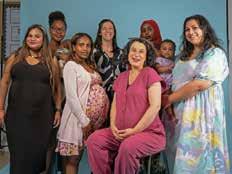
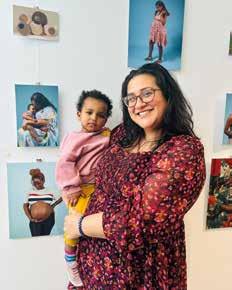
channelling my inner artist is a memory and experience I will cherish forever.”
The outcome of this project has been a rich and varied collection of imagery which highlights empowerment, difference, identity, culture and choice – all powerful themes that maternity professionals consider when planning holistic, safe and compassionate care. The exhibition formed part of a health equity education event for staff which was organised in collaboration with Leeds Maternity & Neonatal Voices Partnership (MNVP).
Jenny Roddy, Consultant Midwife Health Equity, said: “We are delighted with the photo exhibition, which is a real celebration of empowerment and motherhood. Our work as a Health Equity team is driven by listening to patient voices to truly understand experiences and make improvements. Maternal Journal classes brought people from different cultures and communities together, enabling them to feel safe to ask questions and discuss topics including baby’s movements and breastfeeding. We received overwhelmingly positive feedback from attendees, who found it a meaningful way to express themselves while also reducing social isolation and improving peer-to-peer connection, particularly for those who are refugees or new to the UK.”
The ‘Through My Eyes’ exhibition is on display at Thackray Museum of Medicine until May 2025.
Hundreds of babies have begun to be tested for over 200 rare genetic conditions as part of a world-leading study that has launched in Leeds.
The Generation Study, led by Genomics England in partnership with NHS England, offers whole genome sequencing using blood samples taken from the umbilical cord of newborn babies shortly after birth.
The study will identify more than 200 conditions in babies where symptoms might not present until later in childhood. This can help to prevent longer-term health problems associated with certain conditions, keeping children out of hospital, and helping them live healthier lives.
The first person to be recruited in Leeds was midwife Georgie, who is expecting her first baby in April. She said: “As midwives, we see every day how research makes a difference to the care we provide, so I didn’t hesitate to sign up. Having the test will hopefully give me peace of mind when my baby is born and help future generations too.”
The very first baby to have their cord blood tested in Leeds was Suvansh Patel, born on 4
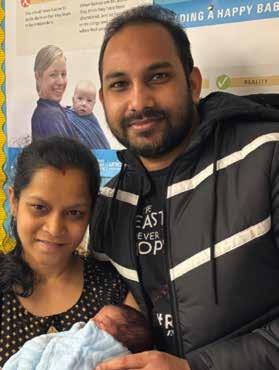
December by Caesarean section. In a twist of fate, it was midwife Georgie who took the cord blood sample for the Generation Study! Suvansh’s mum Sonalika said: “It was important to us to sign up so that we can find out about any problems and get treatments earlier so that my baby can have a longer, healthier life. We know we will be supported by the hospital if anything is found when we get the test results. We are very grateful to midwife Georgie and all the maternity team for their care and kindness after Suvansh’s early arrival. The neonatal unit have also been amazing and looked after us very well.”
Expectant parents are informed about the study during pregnancy and, if interested, a research midwife will have a detailed conversation with them to decide if they want to take part.
If a baby is identified as having a treatable childhood condition through the genome sequencing, families and carers will be provided with further testing to confirm a diagnosis, and ongoing support and treatment from the NHS.
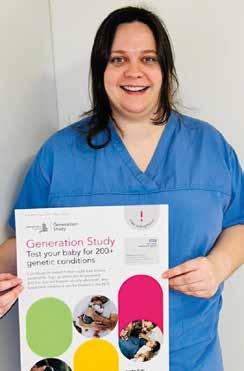
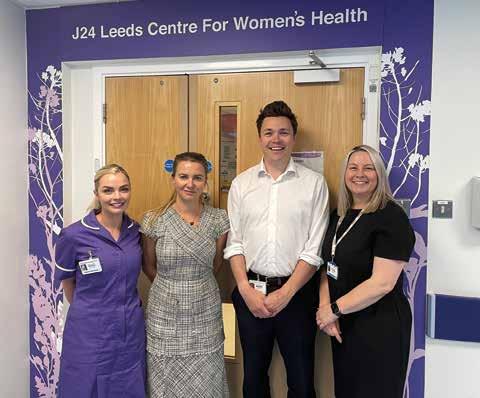
The Endometriosis team is proud to have been awarded provisional status as a British Society for Gynaecological Endoscopy (BSGE) Accredited Endometriosis Centre.
This prestigious accreditation reflects the highest standards of care and signifies the Trust’s commitment to excellence in endometriosis treatment. Achieving BSGE accreditation will position Leeds among the top hospitals in the UK for endometriosis treatment, recognised for their clinical expertise, patient-centred approach, and commitment to ongoing research and innovation.
The team have made significant advancements in the treatment of endometriosis, including the introduction of robotic surgery and new opportunities to take part in research. Last year they started performing endometriosis surgery using a surgical robot. This cuttingedge technology is less invasive and allows for greater precision and shorter recovery times – with many patients going home on the same day.
Endometriosis affects millions of women worldwide, causing chronic pain and impacting their daily life. In response to the increase in referrals for specialist care, LTHT has taken a significant step forward by creating this dedicated team to provide more support for patients with endometriosis.
Leeds will also host the BSGE Annual Scientific Meeting in April 2025, bringing together internationally renowned gynaecology specialists and putting the city on the map for endometriosis care.
James Tibbott, Clinical Lead for Gynaecology, said: “We are delighted to have been awarded provisional accreditation, which is the culmination of years of hard work from our gynaecology team supported specialties including radiology, colorectal surgery, urology surgery, thoracic surgery, plastic surgery and pain management. We are dedicated to achieving excellence in endometriosis treatment, reducing waiting times and improving quality of life for our patients.”
At the beginning of Dry January, the Trust took the opportunity to promote liver health in the city, as together with colleagues from the Liver Unit, three Leeds MPs were hosted, The Rt Hon Hilary Benn, Fabian Hamilton and Richard Burgon.
The meeting was set up by Richard Parker, Consultant Hepatologist, to discuss the challenges and importance
of this topic, with additional invited participants including Cllr Fiona Venner and Dr Pippa Bird from Leeds City Council and representatives from Forward Leeds and the British Liver Trust. A liver transplant patient provided their enlightening personal story to really bring home the value of what the Trust and its specialist teams deliver.
The focus was to raise awareness of
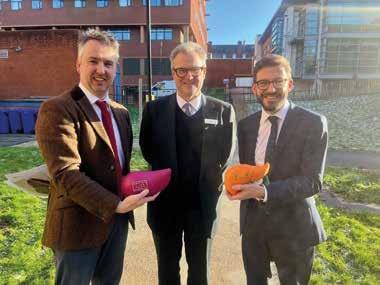
liver disease and the links to poor diet, obesity and alcohol abuse, calling for support from the MPs around public health messaging. Prof. Phil Wood, Chief Executive, chaired the engaging session and gave feedback about the pride he felt when presenting the work of the liver team and liver transplant service, who care for more than 10 million people across a large patch of northern England.
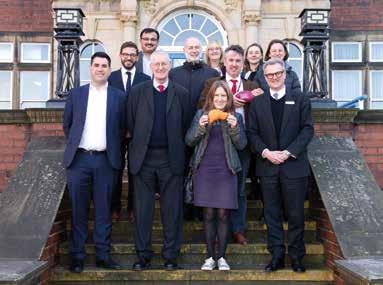
The Men’s Action and Awareness Network (MAAN) at LTHT celebrated its third anniversary in February.
Started three years ago by colleagues David Goulding and James Royal, the group supports the health and wellbeing needs of men at the Trust. Meeting monthly, regular guest speakers have provided expert advice on a range of men’s health topics, including fitness and mental health issues.
At a special birthday event in February, guest speakers from the past three years reunited with the network to celebrate the milestone. Inspirational speaker Mike Bates also joined the celebrations. Mike is a former human intelligence specialist, counter-terrorism leader and commando, and shared his inspiring story to help MAAN members live a life without limits.
Former guest speakers who also celebrated included George Riley, broadcaster; Claire Lang, Motor Neurone Disease Lead Nurse at LTHT; and Ian & Rachael Flatt, MND campaigners and Leeds Hospitals Charity fundraisers.
Recent funding donated by Leeds Hospitals Charity has helped allow the group to flourish.
David Goulding, HR Business Partner for Abdominal Medicine and Surgery at the Trust, said: “The last three years have been an incredible journey for MAAN. We are now an official LTHT Network raising awareness and promoting all aspects of men’s physical and mental wellbeing. None of what we have achieved would be possible without the support of the fantastic guest speakers who have given up their time to support MAAN and share their experiences.”
He added: “Our ambitions for the future is to make MAAN available for all NHS staff across the UK whilst continuing to make a difference to men’s health at LTHT.”
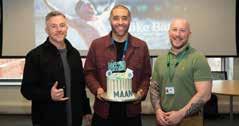
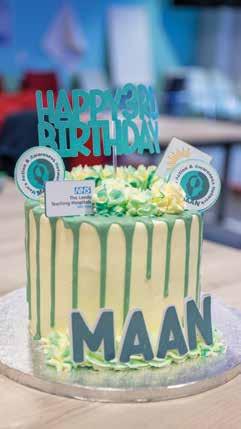
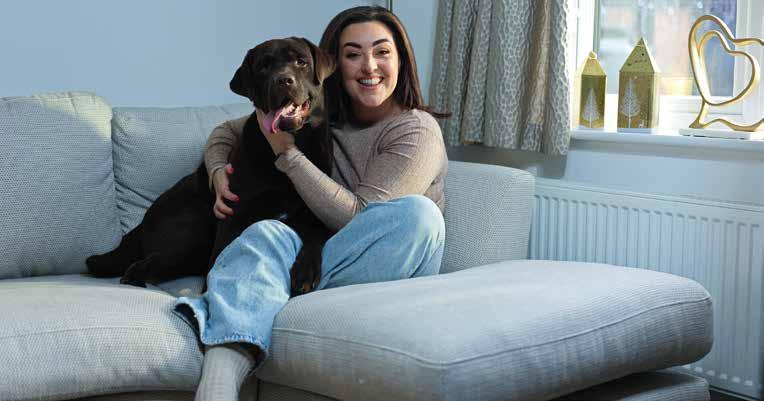
Bianca Perea, a 32-year-old trainee lawyer from Manchester, is the first person in the UK to have a liver transplant for advanced bowel cancer that has spread to the liver.
Bianca, who is a patient at The Christie NHS Foundation Trust, a specialist cancer centre in Manchester, had the successful operation at LTHT during the summer. She is now cancer free.
Bianca, who lives in Wigan with her dog, a lab called Cubby, was diagnosed with stage four bowel cancer, the most advanced kind, in November 2021. She was just 29 at the time. She had been feeling a bit constipated and bloated, but otherwise had no other symptoms.
She was referred to her local hospital where she had emergency bloods and a stool sample taken. This was followed by a colonoscopy and a biopsy. These investigations revealed that she had bowel cancer which had spread to all eight segments of her liver. According to Cancer Research UK, only one in ten people with advanced bowel cancer will survive for five years or more after diagnosis.
“To be diagnosed with bowel cancer at such a young age was a shock,” Bianca said. “As it had spread, they told me that they could only offer me palliative chemotherapy. I heard what they said but the prognosis just didn’t seem real, I just couldn’t take it in.
“Even though I didn’t have many symptoms, I had a hunch that something was wrong as I know my body and what’s normal for me. I would encourage anyone who is worried to go and see their GP as soon as possible, as the earlier you are diagnosed, the better.”
Bianca was referred to The Christie’s local treatment centre in Wigan in early December 2021 where she had 37 rounds of a targeted drug called panitumumab and chemotherapy over two and a half years. She had an excellent response to the treatment – it shrunk the tumour – so she then had an operation in May 2023 to remove the part of the bowel where the tumour was.
However, scans showed she still had tumours in her liver, which couldn’t be operated on. She was referred to Leeds, where she was told that she was a good candidate for a transplant because the cancer had spread to her liver only and because, following her operation, she now had no tumours in her bowel.
The team at Leeds is part of a national NHS liver transplant programme for people with non-liver primary cancers and is one of six dedicated centres in the country. Before being able to be added to the list, Bianca had to be doing well on treatment for two years. She hit this milestone in
December 2023, was added to the list in February 2024, and had her operation in the summer. The surgery was successful, and her teams at LTHT and The Christie are hopeful the cancer won’t return.
Bianca said: “I am so grateful to the family who agreed to donate their loved one’s liver so I could live. Without them making that choice, I wouldn’t be here today. I also wouldn’t be here without my incredible teams, both at The Christie and at Leeds. Everything that was happening to me was so scary, but I always felt in incredibly safe hands. I can’t thank them enough for what they’ve done for me.”
Dr Ian Rowe, Honorary Consultant Hepatologist at Leeds Teaching Hospitals NHS Trust, said: “I’m delighted that Bianca has responded so well to the treatment and that she is now cancer free. In Leeds we are the third biggest centre for liver transplantation in the UK, and our specialist team serves a wide population across the North of England. We are, of course, indebted to the family of the organ donor – as is made clear with Bianca’s case, organ donation saves lives. It is important that people register their decision to donate on the NHS Organ Donor Register and make their decision known to their loved ones. Families will always be consulted on any decisions around organ donation.”

The past year has seen an enormous effort from colleagues right across the organisation to focus on our 7 Commitments and bring meaningful change in these areas. Take a look at the infographic below that sets out just some of our achievements.
From our Timeliness commitment, over 80% of patients now receive their cancer diagnosis earlier or can move onto treatment pathways sooner, which we know helps improve outcomes.
From our Finance commitment, £5m has
been saved through theatre productivity improvements, which also means that more patients have been able to have their surgery quicker than they would have otherwise.
Meanwhile, work put towards our Care commitment has shown a 21% in MSSA bloodstream infection cases, which shows how Infection Prevention and Control remains a core focus for everyone in our hospitals.
A really big thank you to all teams for your continued effort and hard work –it’s something we can all be proud of.
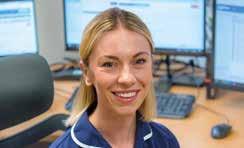

“Using PPM+ custom lists helps us quickly and easily identify our sickest patients at a glance. Early recognition and intervention is often crucial for patients needing Critical Care, and PPM+ helps us provide specialist care faster. Using a digital system gives us easy access to data, which we use to identify trends and inform future decision making.”
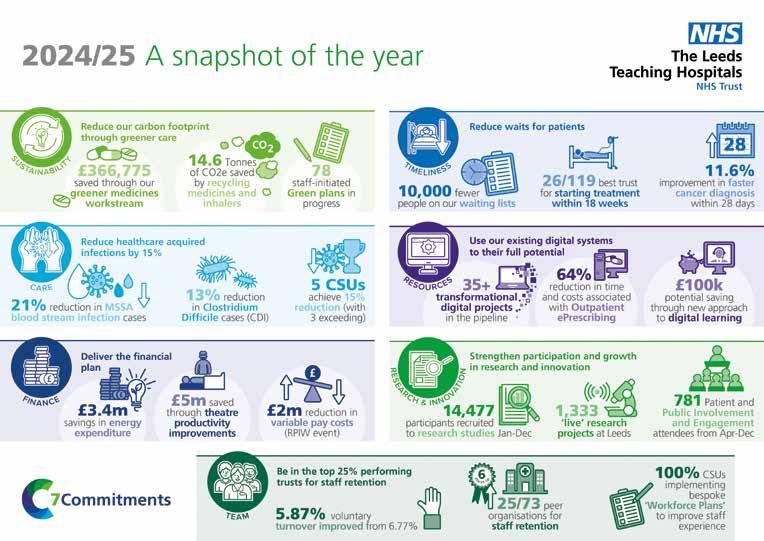
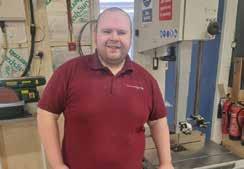

“I help to repair and reuse existing resources across the estate to help reduce our carbon footprint. I have recently been revamping the nursery play equipment by repairing it and giving their outdoor toys a new lease of life, by fixing and reusing what we already have.”
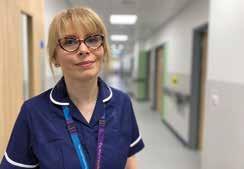
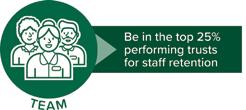
“I’ve helped devise an in-house training programme dedicated to the professional development of our nursing team. Investing in training not only makes staff more knowledgeable, but also helps them feel valued and more motivated to progress in their roles.”
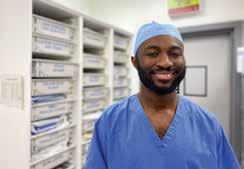

“I’m an international nurse and I’ve worked in the robotic theatre department for nearly two years. My work is really exciting as I’ve seen how our service has accelerated during this time – more patients from more specialties are benefiting from faster recovery times than ever before.”


“I’m committed to innovating our healthcare delivery through RPA. This not only enhances efficiency and accuracy but also frees up our valued staff to focus on what truly matters—patient care and service excellence. By embedding RPA in our administrative systems, we’re not just saving time and costs, we’re investing in our most precious resource—our people.”
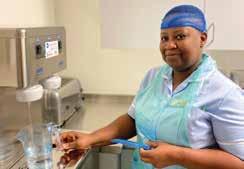

“I keep patients safe, refilling their water jugs from the dedicated filtered water machines. These were introduced for filling patient water to ensure the jugs do not come into contact with the sink and its surrounding surfaces, reducing any potential risk of drain contamination from the water jugs to the patient bed space.”


“I support staff to transform their ideas into innovations that benefit patients and staff. This can be though training, business development support, and connecting staff into our innovation communities.”
Surgeons at the Trust have performed a groundbreaking procedure to remove a tumour through the eye socket. Ruvimbo Kaviya, aged 40, recently became the first person in the UK to have a tumour removed using a flexible tube and camera called an endoscope through her eye socket.
Ruvimbo, who received her diagnosis in 2023, had been experiencing persistent headaches for months, initially managed with pain relief. By February 2022, the pain had intensified, with spasm-like sensations that led her to believe she had a toothache. A visit to her dentist revealed no issues, prompting her to seek help at the Emergency Department at LGI. After an MRI scan, she was diagnosed with meningiomas on the right side of the back of her brain and left side of her eye - pressing on the nerve surrounding her eye. It was in the area called cavernous sinus which is difficult to access and is considered somewhat inoperable.
Ruvimbo said: “The diagnosis came as a shock. It was an incredibly stressful and overwhelming time. The pain was severe, and managing my medication was difficult. When I was told about the surgery, I stayed optimistic as the tumour was growing. Going ahead with the procedure was the best option for me.”
The procedure, carried out by Mr Asim
Sheikh and Mr Jiten Parmar, represents a shift in how skull base tumours are treated. Unlike traditional surgery, which often requires big incisions, removing parts of the skull and involves extended recovery, this innovative technique is minimally invasive. Surgeons accessed the tumour through a small, 1.5cm incision on the side of Ruvimbo’s eyelid.
“I was amazed by the recovery,” Ruvimbo said. “I was only in the hospital for two days, with no side effects or swelling. I feel perfectly fine now. I am deeply grateful to Mr Sheikh, Mr Parmar, and the entire team—they reassured me throughout the process.”
Skull base tumours are found at the base of the skull, and their removal has traditionally required an open craniotomy, a procedure involving significant trauma to the surrounding tissues and a lengthy recovery. The endoscopic trans-orbital approach offers a safer alternative with a faster healing process.
Mr Asim Sheikh, Consultant Skullbase and Neurovascular Neurosurgeon at LTHT said: “This technique allows us to remove tumours without opening the skull or having to retract or compress the brain. The minimally invasive nature of the procedure significantly reduces trauma, enabling patients to recover faster with minimal visible scarring.”
Mr Jiten Parmar, Consultant in Maxillofacial Surgery at the Trust added: “The ability to work collaboratively with maxillofacial and neurosurgical teams, using cutting-edge 3D planning, has been a game changer. This partnership allows us to precisely target the tumour, ensuring safer outcomes for patients.”
The success of this surgery was underpinned by innovative 3D planning led by Lisa Ferrie, the Trust’s Biomedical Engineer and 3D Planning Service Lead. The 3D model was used to perform steps of surgery on the life size model, prior to actual surgery taking place.
“When the surgical team approached me, we used scans of Ruvimbo’s brain and skull to create a 3D replica model,” Lisa explained. “This technology enabled the team to study her anatomy in detail and prepare for the procedure with unparalleled accuracy. Seeing the model and knowing it contributed to this groundbreaking surgery is incredibly rewarding.”
The Trust continues to lead the way in medical innovation, combining advanced technology with worldclass surgical expertise. The success of Ruvimbo’s surgery demonstrates the potential for this approach to transform the lives of patients with skull base tumours.
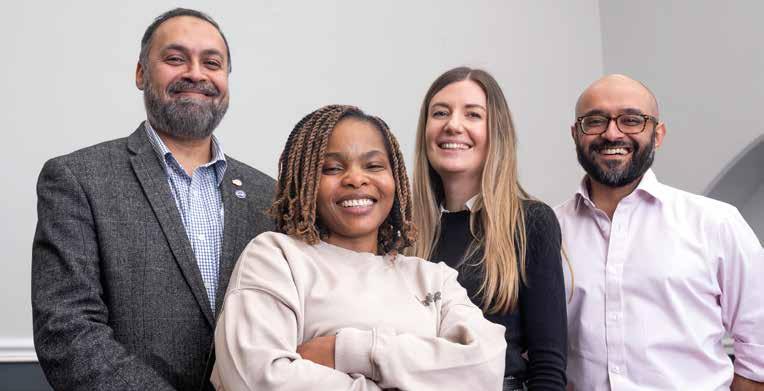
In January, LTHT was revealed to be the UK’s top recruiter for medical device studies, leading the nation in giving patients access to pioneering treatments that could transform care for millions across the NHS.
Analysis of National Institute for Health and Care Research (NIHR) data shows the Trust recruited more than 5,000 participants to cutting-edge studies in 2023-24, including several UK and world firsts.
A medical device is any instrument other than a medicine that is used to diagnose, monitor, treat or manage a medical condition and can include syringes, dressings, surgical tools, scanners, software, apparatus, machines and some medical apps. These innovations are crucial to modern healthcare, enabling faster diagnosis, less invasive treatments and quicker recovery times for patients.
This leadership position in research builds on Leeds’ proud heritage in medical innovation, stretching back to the early 19th century when Charles Thackray collaborated with Leeds General Infirmary surgeons to pioneer surgical instruments. Today, Leeds sits at the heart of a £3 billion regional health tech sector, home to more than 250 companies employing 16,000 people.
Dr Ai Lyn Tan, Director of Research and Innovation, said: “Our achievement as the UK’s top recruiter for medical device studies showcases Leeds at its innovative best. From pioneering liver cancer treatment without incisions, to addressing microscopic heart blockages that were previously almost impossible to treat, we’re pushing the boundaries of what’s possible in patient care.
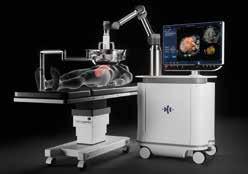
“Being the UK’s leading recruiter means thousands of our patients get early access to breakthrough treatments. But the impact extends far beyond Leeds –successful trials help reduce waiting lists, attract investment to our region, and ultimately provide blueprints for better treatments that can be adopted across the NHS and globally.”
An internationally groundbreaking Leeds study has revealed the benefits of screening for heart failure and specialised care for people with pacemakers.
The study, published in Nature Medicine in December, is one of the largest of its kind in the world, and demonstrates the effectiveness of screening and management with major implications for global healthcare policy. The research found ultrasound screening can detect heart muscle weakness in people with pacemakers, which is best treated in specialised heart failure services.
1,201 patients were randomly assigned to heart scans with possible treatment changes or standard care. The results suggest advantages for patients managed in a specialist clinic compared to those under the usual care pathways. Patients in the specialist clinic received tailored medication regimes, and pacemaker programming to manage their heart failure.
With up to 30% of the UK’s one million pacemaker users having undiagnosed heart failure, the study underscores the need for combined heart failurepacemaker clinics and could shape global guidelines.
The trial was carried out by researchers at the National Institute for Health and
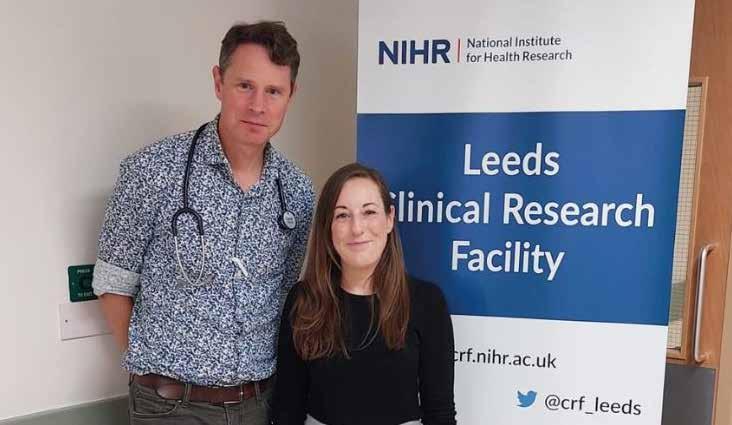
Care Research (NIHR) Leeds Biomedical Research Centre (BRC), a cooperative centre of excellence hosted at the Trust which brings together researchers from LTHT, the Leeds and York universities and industry.
Pacemakers send electrical pulses to the heart to keep it beating regularly and not too slowly. They can significantly improve quality of life but can inadvertently contribute to heart muscle weakness, especially in patients with pre-existing conditions.
An expert team led by cardiac scientist
Klaus Witte investigated whether screening for heart muscle weakness followed by treatment with medication could reduce hospitalisations and extend lifespans.
Dr Paton said: “The study has the potential to reshape how patients using pacemakers are managed. If future research replicates these results, guidelines for managing patients using pacemakers could shift globally, emphasising the need for access to heart function assessments and tailored care.”
The review that the Government has been carrying out into the New Hospital Programme, which aims to place the Programme on a more sustainable footing, concluded in January. The Secretary of State for Health, Wes Streeting MP, made an announcement in the House of Commons on 20 January and provided a plan and a timeline to deliver all schemes in the national programme and announced the New Hospital Programme will now be delivered through waves of investment.
This announcement confirmed that Leeds Teaching Hospitals has been placed in Wave 2, which means the construction of our new hospital at Leeds General Infirmary will not start until at least 2033. The Trust has also been asked to pause development of the scheme until 2030. Prof. Phil Wood, Chief Executive, said: “We are extremely disappointed to hear that we will be unable to start construction on the new hospital at Leeds General Infirmary until at least 2033. We have been waiting since 2019 to build this new hospital for our patients, staff and communities in Leeds, Yorkshire and beyond. We will continue to work with the New Hospital Programme, to understand the detail of this

announcement and what this means for our plans. We also need to understand the impact this delay will have on our hospital services and our ageing estate, which has one of the highest backlog maintenance requirements in the NHS.”
“For some time now, Leeds Teaching Hospitals NHS Trust has had advanced and well-developed plans for a new hospital at Leeds General Infirmary. We have a cleared construction site,
Leaders from Leeds City Council, the West Yorkshire Combined Authority, the University of Leeds, Leeds Beckett University and LTHT have reaffirmed their unwavering commitment to innovation and growth across the city, despite delays to the new hospital programme.
The partnership confirmed it would continue to deliver on its longterm vision for driving innovation and growth in the city to create a healthier, greener and more inclusive future for all.
Despite the Government’s announcement of delays to the development of the new hospital at Leeds General Infirmary, city leaders have announced that plans for the Leeds Innovation Village, a key neighbourhood within the city’s £2
billion Leeds Innovation Arc, and one of the flagship projects of the £160 million West Yorkshire Investment Zone – will still go ahead, with ambitions to start construction later this year.
The Village, which is set to bring about £13 billion in economic growth for the city and around 4,000 jobs, will continue and is already into its first phase. This includes the redevelopment of the Old Medical School on the Leeds General Infirmary site into a cutting-edge healthtech innovation hub by one of the UK’s most active, privately-owned, mixed-use developers, Scarborough Group International.
Dame Linda Pollarr, Trust Chair, said: “Our plans for a new hospital are more than healthcare and play a pivotal role in harnessing innovation and stimulating growth across Leeds and
made considerable progress with our preparatory works and have been working towards securing more detailed planning consent, following the outline planning consent which was secured in 2020.”
The Trust’s priority is now ensuring it provides safe and effective patient care in appropriate environments and continues to work through the details and the impact if the Trust is unable to deliver a new hospital until almost 2040.

beyond. Despite the announcement of disappointing delays to our new hospital at Leeds General Infirmary, plans for the Leeds Innovation Village will still go ahead, with early phases already underway.”
The development of a new hospital at Leeds General Infirmary, alongside wider plans to boost growth and innovation across the city, are a central part of the West Yorkshire Mayor’s local growth plan, which aims to boost the region’s fastest-growing business sectors with a special focus on health and life sciences, in line with the Government’s emerging national industrial strategy.
A new automation track – one of the UK’s largest and most complex tracks for testing pathology samples – is being installed at the Centre for Laboratory Medicine (CfLM) at St James’s Hospital.
Part of an extensive remodelling of pathology services across the region, the new cutting-edge equipment is a key element to provide faster turnaround times with less hands-on time required.
As well as supporting improvements in diagnosis and treatment for patients, the new automated technologies will help to meet the growing demand for specialist care.
The new automation track will connect a greater range of analysers and automatically distribute samples between them, rather than moving samples manually, thereby reducing potential delays in the testing and reporting of results.
Jenny Ehrhardt, Director of Finance and Senior Responsible Officer for the Building the Leeds Way Programme at LTHT said: “Our newly installed equipment means the facility is now one step closer to driving improvements in the way we diagnose patients, not just in Leeds but for those living right across the region. By consolidating services and scaling up activity at one central facility and linking certain specialities, we will be able to share expertise across services and create a regional pathology centre of excellence. Our long-term vision is to deliver an improved, cost effective and enhanced diagnostic service for patients across West Yorkshire and Harrogate and this new equipment and state-of-the-art facilities will help to meet the growing regional demand for specialist treatment and care.”
The Centre for Laboratory Medicine is expected to be fully operational in 2025.
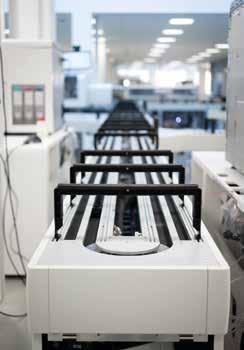
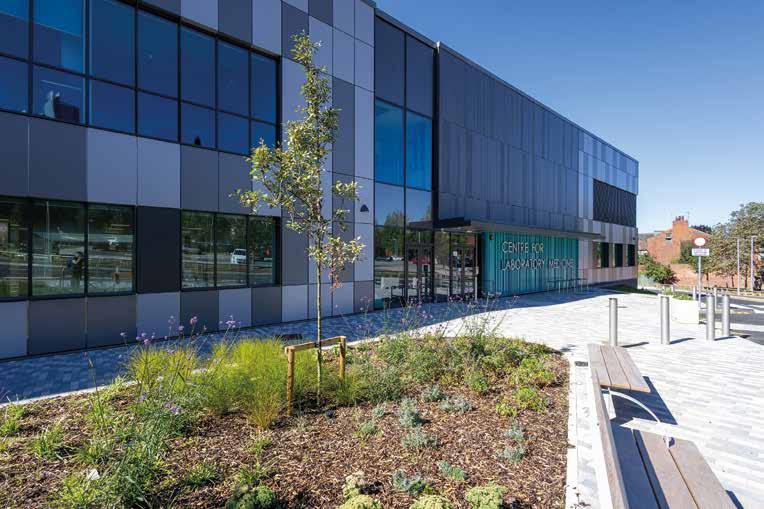
By Jonathon Legg, Head of Cyber
In today’s digital world, Cyber Security has become a critical part of our conversations, especially in healthcare, where safeguarding patient data and systems is a top priority. The good news is that it doesn’t have to be complicated – a few small steps can make a real difference.

Scammers are getting smarter, crafting emails to look genuine. Always check the sender’s email address carefully –one wrong letter can be the difference between a legitimate request and a
As we eagerly anticipate warmer days and more time outdoors, we’re excited to share that plans have been approved for a wellbeing garden at St James’s Trust Headquarters. Recent preparatory work around the path to Gledhow Wing was a tease that work was about to start; hopefully, the new Leeds Hospitals Wellbeing Garden could be ready by late summer.
This project, supported by a £50,000 grant from Leeds Hospitals Charity (LHC) with additional funding from other charitable trusts, is sponsored by the Royal Horticultural Society (RHS). The design, led by Adam Frost—renowned for his work on BBC Gardener’s World and the Chelsea Flower Show—includes input from hospital staff, patients, and the local community. This collaborative approach ensures the space meets diverse needs, offering areas for quiet reflection and spaces for therapeutic activities.
More than just a garden, the project highlights the benefits of greenspaces in healthcare, with the RHS showcasing Leeds as a benchmark
phishing scam. If you weren’t expecting an email from the sender, stop and think before acting and if in doubt, report it to the Cyber Security team. Red flags like poor grammar, spelling mistakes, or requests that feel urgent or suspicious are often signs of phishing. Trust your instincts — it’s always better to be cautious.
One common misconception about cyber security is that it’s solely the responsibility of the IT department. Whilst IT play a big role, keeping systems secure is a team effort. Think of IT as the mechanics who maintain the car but remember you’re the driver. If you’re not locking the doors or paying attention to warning lights, you’re putting the whole car at risk.
Another myth is that a strong password is enough. While it’s a great start, it’s not foolproof. Multi-factor authentication (MFA) adds an extra layer of security. Even if someone gets your password, MFA makes it much harder for them to get in.
In summary, don’t write your password down where others can see it, don’t reuse them for different accounts and enable MFA wherever you can – at work, for personal email, and even social media accounts. It’s one of the simplest and most effective ways to keep your accounts secure.
Cyber Security doesn’t have to be overwhelming – a little awareness and a few good habits can go a long way in protecting what matters most.
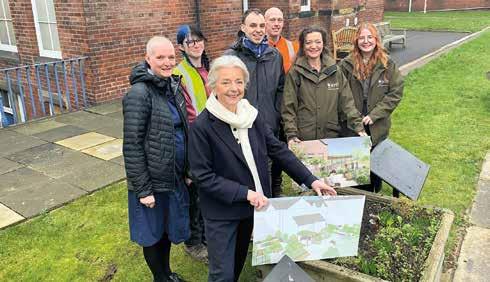
for its initiative to integrate nature into healthcare wellbeing strategies. Research underscores the value of gardens in improving mental and physical health, fostering community, and boosting resilience. Gardens also contribute to environmental health by enhancing air quality, promoting biodiversity, and reducing the impact of heatwaves and flooding.
The RHS has already been engaging Leeds staff with monthly outdoor activities and will continue to provide support for two years, ensuring the garden thrives as a vibrant hub for healing and connection.
Stay tuned for updates on this inspiring initiative set to transform one of our green spaces.
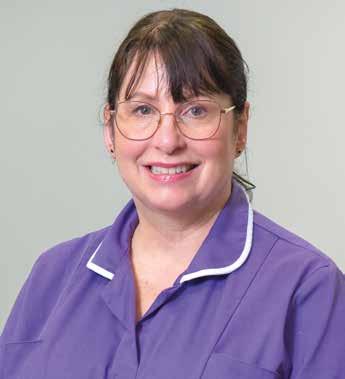
Jane is a Research Midwife and has worked at the Trust for 36 years
What are the main aspects of your role?
In the Reproductive Health and Childbirth Research team, our portfolio is led by midwives, nurses and clinical trials assistants, and we have some exciting studies on the horizon.
I have been leading on a number of different studies including BaBI Leeds, MiNESS 20-28, Craft and PRESTIGE-PTB.
Have a brew – it’s on us!
Leeds Hospitals Charity has been brewing up something special for the hardworking staff across the Trust. This year, they will be providing free tea and coffee to all the amazing people who keep the hospitals running smoothly.
Deliveries started to appear in February as a huge thank you to the teams for their hard work and dedication. The first delivery was made to colleagues in Geoffrey Giles Theatres at St James’s Hospital by our Chief Executive, Prof. Phil Wood, and the charity’s Director of Finance and Corporate Services, Eve Hartrick. There will also be a top up
What else have you done in your career so far?
I trained as a nurse in Manchester and came to Leeds to train as a midwife. I have worked in most areas in midwifery, but the majority of this time was in the community. I was very involved with homebirth and enjoyed providing continuity of care.
I started my career in research in 2020. This was an exciting and challenging time with Covid. However, reporting to UKOSS and other Covid studies I could see that research was making a difference to care.
I have now clocked up 40 years in the NHS!
What’s the best thing about your job?
Everyday is different and being a part of research is helping to make a difference.
Thinking ‘out of the box’ on how to promote research is challenging but rewarding… and I do like an Excel spreadsheet
What is the one thing you would change at LTHT to help you do your job better?
Opportunities to network as much as possible, often so much more is achieved with a face-toface meeting.
What’s your best advice to a new starter at the Trust?
Check out all the learning opportunities available on the LTHT intranet and look at all areas to work, you will find your happy place.
delivery for colleagues later in the year.
Chief Executive Prof. Wood said: “Having access to refreshments is essential to help people recharge during a busy day and have a moment of respite. We really appreciate our charity’s support to make this happen.”
Eve Hartrick, Director of Finance and Corporate Services, is delighted to be supporting this gesture. “The teams across the hospital work so hard and in difficult environments sometimes, making sure they have access to a warm drink is just a small way we can support them in their amazing work.”
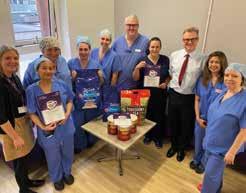
Delivering tea and coffee to more than 20,000 staff is no small job – thank you to everyone who made this happen, particularly our colleagues in supplies. Enjoy your brew!
Our Estates & Facilities teams have been working hard on a range of projects that benefit our Trust, workforce improvements to support staff and vital workstreams to help us reach our sustainability commitments.
Within E&F, we have the largest staff group, working across every part of the Trust, so there’s always something going on in our patch that’s worth celebrating. Here are just a few of the most recent updates from Estates & Facilities.
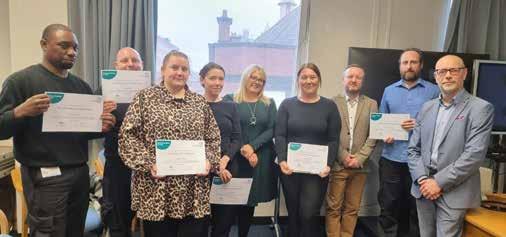
Our facilities teams are dedicated to offering opportunities for progression and learning. As part of our Facilities Future For You Programme, our teams have now held more than 25 career conversations, provided shadowing opportunities, apprenticeships, and access to functional skills courses to support our facilities staff in reaching their career aspirations within LTHT.
Furthermore, we’ve developed a bespoke Facilities Management Foundation Programme, which was initially developed following feedback provided from the supervisory teams. The six-month course has been completed by more than 50 supervisors since it’s initiation in 2022, and our fourth cohort recently graduated in February.
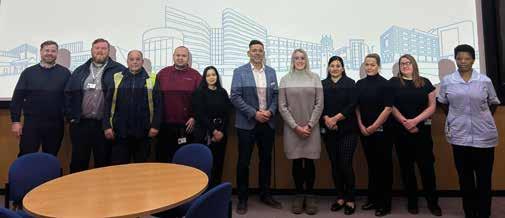
In E&F we recently celebrated National Apprenticeship Week in February. And, as the largest staff group in the Trust, we are lucky to be able to offer a range of apprenticeships across almost all our areas.
We aim to offer apprenticeship opportunities across as much of Estates and Facilities as possible and have filled
positions like Property Maintenance Operative, Fire Safety Apprentice and Level 7 Leadership.
Our apprentices offer a massive benefit to the Trust and E&F teams, and we’re dedicated to supporting them in learning, growing and taking their careers in Estates and Facilities to the next level.
Our Lean2Green team, a newly formed group committed to providing direction for our route to net zero, has been working hard on developing a new Green Plan for 2025. Expected in April, the plan will pave the way for the Trust to offer greener care and a greener environment for our patients, visitors and staff.
The plan will ensure the Trust is supporting the NHS-wide ambition to become the world’s first healthcare system to reach net zero carbon emissions, while prioritising interventions that simultaneously improve patient care and community wellbeing, tackling climate change and broader sustainability issues.
The work from the Lean2Green team will support the Trust in planning capital investments, while also increasing our efficiencies too.
Look out for the new Green Plan in April 2025 to ensure you and your teams are aware of what we can do as a Trust to create a greener LTHT.
Our PMVA team have launched one of the first Prevention and Management of Violence and Aggression courses in the acute healthcare sector. This pioneering course is designed specifically to support our staff in effectively managing violence and aggression in the safest possible way.
Working in the healthcare setting, our teams are occasionally faced with difficult situations involving violence or aggression. So, our PMVA course was created specifically to support staff, and equip them with the knowledge and skill they need work as safely as possible.
The team work collaboratively across the entire Trust and multiple stakeholders to reduce incidents of violence and aggression and its effects on staff and patients.
This new course goes hand in hand with our Report for Support and Work Without Fear workstreams, which are designed to give LTHT staff as much support as possible when dealing with these types of incidents.
Clare Walton
Clare Walton, Staff Nurse in Breast Outpatients Department, retired in December after 45 years as a nurse at LTHT.
Clare started training as an enrolled nurse in 1981, starting in neurosurgery and then urology, after which she then moved to be a registered nurse in 1992.
For the next period of her career, she worked in general surgery – upper GI, acute surgery and the High Dependency Unit, and then moved to be a junior sister in colorectal surgery. In 2009 she moved to breast surgery as a junior sister covering the breast surgery ward and then for the last five years she has been a staff nurse in the Breast Outpatients Department.
Clare’s retirement speech commented specifically on her care for her colleagues and for always being the patient’s advocate. She will be very much missed by all who knew her.
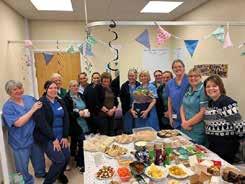
Samantha Burns
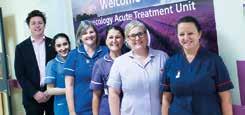
Elizabeth Bhandari, Gynaecology Matron, has retired from the Trust after over 37 dedicated years of service in the NHS, including 14 in Leeds.
She joined the Trust in 1992 as a Junior Sister in IVF. This included leading a project to introduce Intracytoplasmic Sperm Injection (ICSI), which saw the first babies born in Leeds thanks to this procedure.
Elizabeth then spent some time abroad, taking her skills to benefit IVF nurses in Australia.
She returned to the Trust as Matron for Gynaecology in 2019 where she has seen many changes including the establishment of the fertility service at Seacroft Hospital.
St James’s holds a special place in Elizabeth’s heart as it is where she had both her daughters and spent many years of her long career in women’s health. Elizabeth will be missed by all in Gynaecology and will be fondly remembered for the huge difference she has made to the thousands of patients she has cared for over the years.
Samantha (Sam) Burns has recently retired from her post as Specialist Pharmacist as part of the Chapel Allerton Outpatient Dispensary team, after working at the Trust since 2005.
Sam plans to take time to do some travelling and also mentioned she would like to do some volunteer work. She has been a dedicated and hard-working team member and the team would like to wish her all the best on her retirement.
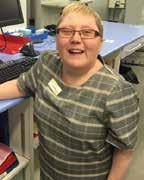
Jaci Johnson, Ward Clerk on Ward L16, has retired. Jaci worked across cardiac surgery and vascular wards as the knowledgeable ward clerk and, as with all ward clerks, will be greatly missed for all the things she did across her working day.
Jaci has some exciting plans ahead and some time to enjoy her family and grandchildren at her leisure. Jaci expressed she will not miss putting that alarm clock on or the commute to work on the train.
Jaci’s colleagues send her into retirement with lots of best wishes for new adventures ahead, saying: “Best wishes and congratulations on your long NHS career and all that came before serving the public. Thank you and enjoy.”
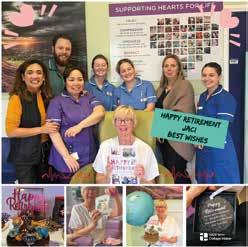
In February, Leeds Hospitals Charity was proud to launch a new photography exhibition, Our Research Story, in collaboration with LTHT and the University of Leeds. This exhibition formed part of the Trust’s Research and Innovation Week.
The exhibition featured beautiful images captured by student photographer, Ruby Lee, showcasing early career researchers and patients right here in Leeds. It demonstrates the inspiring stories behind the research and what this means for patients now and in the future.
Over the last five years, thanks to
donations and Gifts in Wills, Leeds Hospitals Charity has invested £7.06m to kickstart research projects across Leeds Teaching Hospitals.
Rebecca Baldaro-Booth, Head of Grants at Leeds Hospitals Charity, said: “Leeds is at the forefront of so many extraordinary research projects that have the potential to transform outcomes for patients across Yorkshire and beyond. We’re committed to funding new and ongoing studies offering hope to patients living with lifelimiting conditions.
“We’re proud to support the work of early career researchers in Leeds,
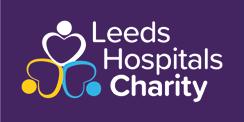
unlocking opportunities for them to progress in their career and spearhead life-changing research. This exhibition is a way for us to show the people behind the projects and shine a spotlight on the incredible difference they are making.”
These stories capture a range of experiences, from working in the labs on ground-breaking research, to taking part in a clinical trial. These inspiring stories demonstrate how research has the power to change lives.
View the full exhibition on the Leeds Hospitals Charity website, search: early career researchers.
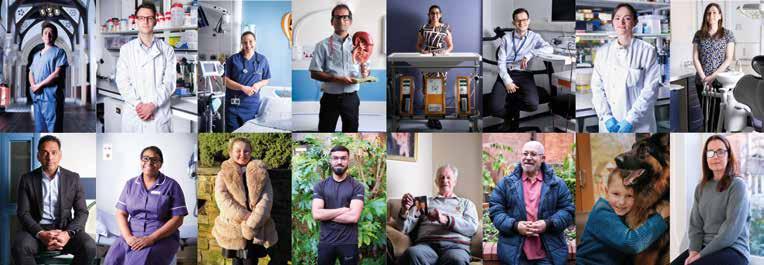
Leeds Hospitals Charity is excited to be launching more funding opportunities from April 2025 for staff across all LTHT hospitals.
So far this year staff have had the opportunity to apply for funding in ten different funding opportunities
and the funding awarded has already begun to make a difference to patients, families and staff across the Trust. Leeds Hospitals Charity is pleased to report that so far this year, it has awarded £1.73m of funding for over 154 projects.
Find out more about funding
priorities on Leeds Hospitals Charity’s website and sign up to the charity newsletter to receive the latest information about upcoming funding opportunities when they become available, search: funding opportunities.
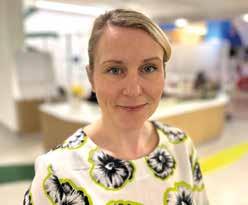
Ruth is a Service Manager and has worked at the Trust for 18 months
What do you do to wind down and relax after a hard week at work?
When my daughter is home for the weekend, I look forward to a good catch-up over a glass of prosecco. I enjoy long dog walks, baking, and reading to relax before the week ahead begins.
What is your ideal holiday destination and why?
Cala Santandria, Menorca, is a personal favourite. I would be happy to holiday here time and time again, stunning views and costal walks, fantastic local cuisine, and the awesome Spanish medieval architecture make it a perfect holiday.
What is your favourite food? French cuisine is my absolute favourite. Specifically, a generous portion of moules-frites.
What did you want to be when you were growing up?
I wanted to be a nurse, but unfortunately science wasn’t my strong suit!
What is your favourite film? Pride and Prejudice
In November, six Giggle Doctors held a ‘take-over’ event at Leeds Children’s Hospital bringing magic, music, silliness and fun to children and staff. The event was organised to celebrate the ten year anniversary in partnership between Theodora Children’s Charity and Leeds Children’s Hospital.
Giggle Doctors are professional performers from Theodora Children’s Charity, who undergo specialist training over two years to equip them to work in hospitals and specialist care centres. Since November 2014, Giggle Doctors like Dr Boogie Woogie and Dr Teapot have been visiting the wards at Leeds Children’s Hospital. Giggle Doctors work alongside the Play Team to help reduce stress and anxiety, create opportunities for play, and improve children’s hospital experience.
Who would you most like to meet and why?
Jennifer Saunders. I have always been a huge fan; I can imagine lots of laughs and an ‘absolutely fabulous’ afternoon in her company.
What is your favourite book?
I’ve read so many! I am really enjoying Bob Mortimer’s recent venture into fiction writing. I highly recommend The Satsuma Complex and look forward to starting The Hotel Avocado.
Tell us something we don’t know about you … I’ve flown light aircraft solo.
When explaining the difference visits make Lisa Beaumont (Therapeutic and Specialised Play Manager) said: “The Giggle Doctors make such a positive impact to all our sick children; they bring smiles and laughter at what can be a very sad and difficult time. Many of our children spend huge periods of time accessing very specialised care at Leeds Children’s Hospital and are often also a long way from family and friends. The Giggle Doctors really do help make such a difference to so many sick children during their wonderful visits.”
In just six months the Giggle Doctors brought joy and laughter to 1,166 children, and by the end of December 2024 they had carried out 100 visits at Leeds Children’s Hospital – their largest ever number in a single year!
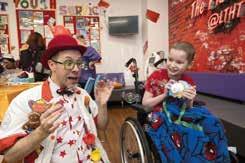
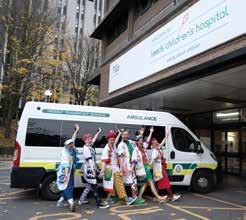
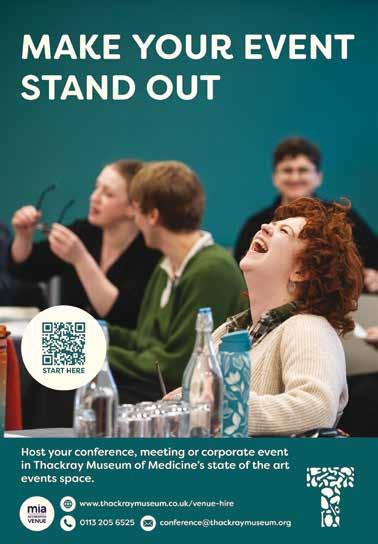




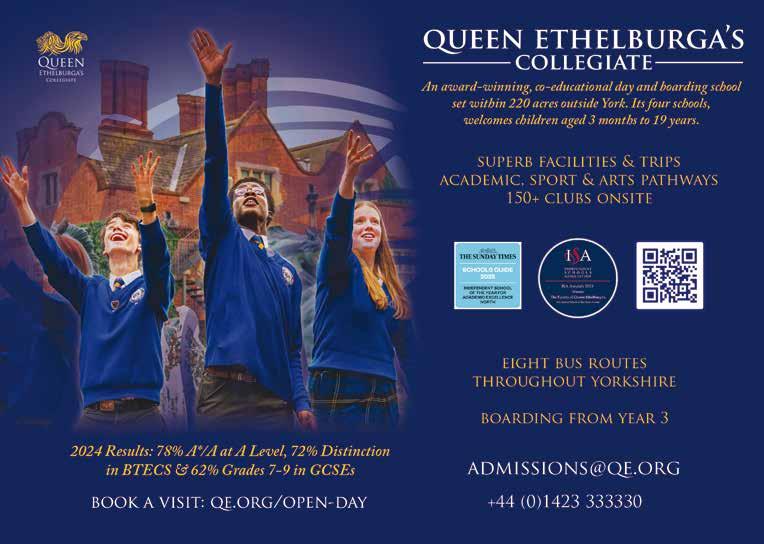

We caught up with Kejal Shah who has been an Optometrist with Specsavers Home Visits for 8 years. She explains to us how this much-needed service works.

So, tell me more about the Home Visits service…
Our at-home eye test is very similar to what you would have experienced in-store, just with a few adjustments and specialist equipment to make it home-friendly.
Optometrists, like myself, carry out the eye test, adjusting it to your individual needs. If glasses are needed, experienced colleagues will help with frame selection and then return to fit them. And, it goes without saying, all customers are supported with ongoing aftercare.
In response to demand, we’ve also now launched a new audiology home visits service. So far, we have home hearing services in 19 locations in the UK, with plans to expand this over the coming months.
Who is able to benefit from a home eye test?
Put simply, it’s about bringing the service to your door, if you can’t get to one of our stores. So if you, a friend, or loved one, are unable to leave your home or care home unaccompanied, due to a physical or mental illness or disability, we can come to you.
There are a wide range of conditions and reasons why someone might not be able to leave their home. You can speak to us about your situation and we can help you understand if you or your loved one qualifies. What if someone is bedbound, or struggling with communication? Can you still help them?
The Home Visits service is designed to provide eyecare which is as individual as our customers are.
Some customers might be clinically vulnerable or they might be non-verbal or living with dementia. Depending on the situation, we might use pictures instead of letters for example. Even with a customer who is bedbound, we can change the position of the chart so we’re still getting completely accurate results. All the tests are adapted to fit the customer’s environment and comfort level. We can also speak to the customer or their loved one ahead of the visit, to address any questions or talk through the process.

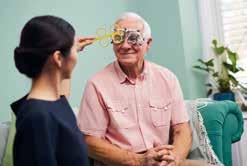
Given that you provide such a personal and tailored service, does your care go beyond just an eye test?
Every colleague I know sees our services as something beyond just a job. Whether it’s sharing stories over a cuppa, popping something in the post for them, or passing them something out of reach, going that extra mile is such a rewarding part of our role. I only need to see a customer’s smile to know I’ve made a difference.
That’s a big part of what we do. Provide a personal service, tailored care and expertise, right to people’s homes, no matter what their situation – in homes, care homes or sheltered housing.
How do I find out whether someone is eligible?
You can head to our website at www.specsavers.co.uk/home-visits which features a simple step-by-step guide to eligibility and a wealth of information. Alternatively, you can call 0800 0890144
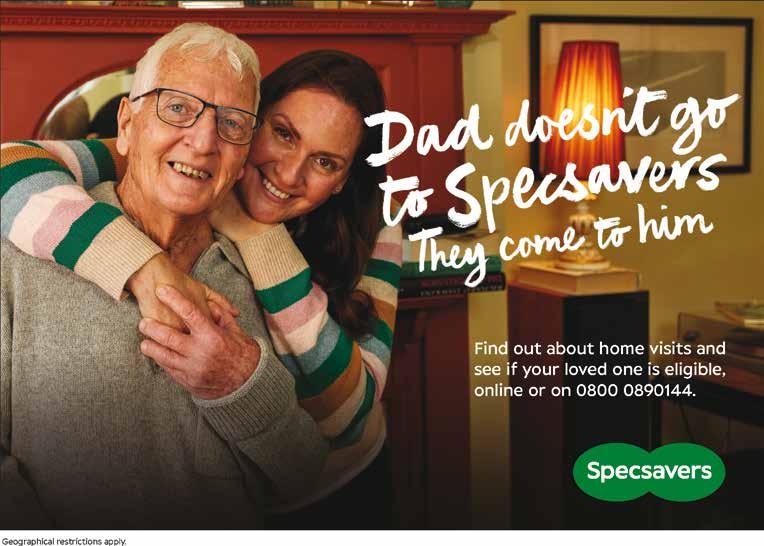
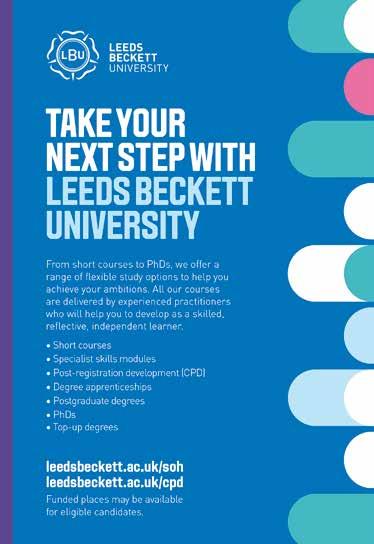




The Leeds Teaching Hospitals NHS Trust has not vetted the advertisers in this publication and accepts no liability for work done or goods supplied by any advertiser. Nor does The
Trust endorse any of the products or services.
Every possible care has been taken to ensure that the information given in this publication is accurate. Whilst the publisher would be grateful to learn of any errors, it cannot accept any liability over and above the cost of the advertisement for loss there by caused. Octagon Design & Marketing Ltd has not vetted the advertisers in this publication and accepts no liability for work done or goods supplied by any advertiser. Nor does Octagon Design & Marketing Ltd endorse any of the products or services. No reproduction by any method whatsoever of any part of this publication is permitted without prior written consent of the copyright owners.
Octagon Design & Marketing Ltd.
Rossington Hall, Great North Road, Doncaster DN11 0HR. Tel: 01302 714528


Our amazing Angels deliver exceptional care in the comfort of your home.
Visiting Angels helps you live independently and flourish with enriching, tailored care.
